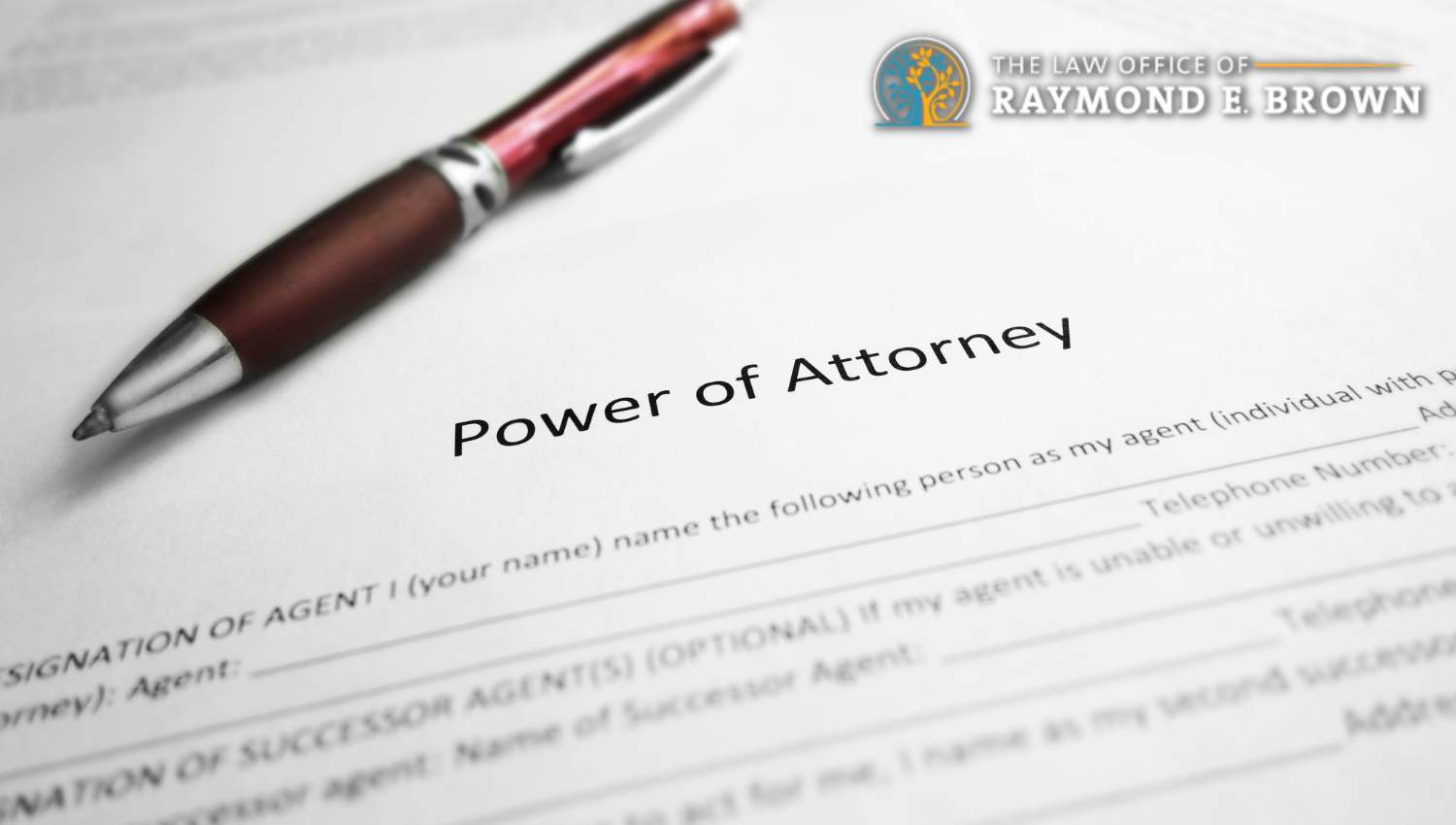When someone dies without leaving a will, their family and loved ones are often left with many questions. One of these questions may relate to who has Power of Attorney in such a situation, if anyone at all. At The Law Office of Raymond E. Brown, our legal team is prepared to address these questions as well as help clients navigate the many other complications that may arise when someone dies intestate.
The fact of the matter is that in the absence of a will, Power of Attorney, typically a role active during the individual’s lifetime, ceases to exist, and the probate court steps in to appoint an administrator or executor to manage the estate according to Maryland laws.
The entire process can be extremely confusing for those left behind, which is why the Annapolis estate planning attorneys at our law firm are committed to providing compassionate and comprehensive legal guidance to help families and loved ones through these challenging times, ensuring that the estate is handled with the utmost care and legal understanding.
If you have questions about granting Power of Attorney in Maryland or creating a will, contact The Law Office of Raymond E. Brown at (443) 554-9944 to schedule a consultation or complete our online intake form.
Understanding Power of Attorney in Maryland
In Maryland, Power of Attorney (POA) is a legal instrument that grants one person, known as the agent or attorney-in-fact, the legal authority to act on behalf of another person, referred to as the principal or grantor. The grantor appoints this personal representative to make financial, legal, or health-related decisions if they are unable to do so. This delegation of authority can be broad or specific based on the terms outlined in the Power of Attorney document.
During the grantor’s lifetime, the Power of Attorney facilitates the management of the grantor’s affairs, especially when the grantor becomes incapacitated or unable to make decisions independently. A Power of Attorney remains in effect until the grantor revokes it, passes away, or, in certain cases, when the grantor becomes incapacitated if the Power of Attorney is not specified as “durable.”
This legal tool is essential for estate planning and ensuring that the grantor’s affairs are managed according to their wishes, providing peace of mind for both the grantor and their loved ones.
Can Power of Attorney Override a Will?
No, Power of Attorney cannot override a will. While a Power of Attorney grants an attorney-agent the authority to make decisions and act on behalf of the grantor during their lifetime, its powers cease upon the grantor’s death. At that point, the will becomes the guiding document for the distribution of the deceased person’s estate.
A will outlines the deceased’s wishes regarding how their assets should be distributed and who should be the executor of their estate. The executor, appointed by the will or the probate court if no will exists, has the legal authority to manage and distribute the estate’s assets per the will’s provisions or state law. While a Power of Attorney is a powerful tool during an individual’s life, it cannot alter or supersede the instructions in a will after the principal’s death.

Is Power of Attorney Valid After Death?
No. Power of Attorney expires upon the principal’s death. As previously mentioned, this legal document only allows an agent or attorney-in-fact to make decisions and act on behalf of the grantor in various matters (including financial, legal, and health-related decisions) while the grantor is still alive.
Once the principal passes away, the authority granted by the Power of Attorney is automatically revoked, and the agent no longer has the legal right to make decisions or act in the capacity of the Power of Attorney. At this point, the management and distribution of the deceased’s estate are governed by their will, if one exists, or by state intestacy laws if no will is present. The executor or a court-appointed administrator then handles the deceased’s affairs.
Does Durable Power of Attorney End at Death?
Yes, even a Durable Power of Attorney ends at the death of the principal. Despite its ‘durable’ nature, which allows the Durable Power of Attorney to stay in effect even if the principal becomes incapacitated, its authority is strictly limited to the principal’s lifetime. This means that no matter how comprehensive or enduring the powers granted by a Durable Power of Attorney may be during the principal’s life, these powers cease to exist upon the principal’s death.
At that point, the legal authority to manage and distribute the deceased’s estate transitions to the executor or personal representative named in the will, or, in the absence of a will, to an administrator appointed by the court. The Durable Power of Attorney is a powerful tool for managing affairs during incapacity, but it does not extend beyond life to influence posthumous matters, which are governed by estate law and the Maryland probate process.
What if There is No Will?
Dying intestate, or without a will, in Maryland triggers a legal process where the state’s intestacy laws determine the distribution of the deceased’s estate. This scenario can lead to outcomes that might not align with the deceased’s wishes, as the distribution of assets is carried out according to a predetermined formula set by the state, prioritizing spouses, children, and other close relatives.
In the absence of a will, the Orphans’ Court in Maryland appoints an administrator, typically a family member of the deceased person, to manage the estate. This administrator’s responsibilities include collecting and evaluating the estate’s assets, paying debts and taxes, and distributing assets to the heirs as defined by Maryland’s intestacy succession laws.
The process can be complicated, often involving detailed court proceedings and potential conflicts among heirs, stressing the importance of having a will to ensure one’s wishes are clearly stated and followed after death.
Who Manages the Estate Then?
When an individual passes away without a will, the court takes a pivotal role in managing the deceased’s estate by appointing an estate administrator. This appointment is typically made by the probate court or, in some jurisdictions, a specific court dedicated to such matters.
The court’s selection process prioritizes individuals closely related to the deceased, such as the surviving spouse, adult children, or other close relatives, ensuring that someone with a vested interest in the estate and potentially a personal understanding of the deceased’s affairs and relationships takes on this responsibility.
The appointed administrator is tasked with various duties, including gathering and valuing the estate’s assets, settling debts, and distributing assets to the heirs according to the state’s intestacy laws. The court also oversees the administrator’s actions, requiring detailed accounting and reports to ensure the estate is managed fairly and following legal standards. This judicial oversight aims to protect the interests of all parties involved and ensure the probate estate is settled orderly and equitably.

The Role of the Estate Administrator
The role of the estate administrator encompasses several key responsibilities throughout the probate process, including:
- Filing a Petition: The process starts with the administrator filing a petition to the court for an official appointment. They must also file the will with the probate court shortly following the grantor’s death.
- Inventory of the Estate: The administrator must conduct a detailed inventory of the deceased’s assets, liabilities, and property.
- Managing Estate Assets: This involves managing the deceased’s bank accounts, safeguarding property, and making decisions about the sale of assets for debt payment or distribution.
- Notification of Interested Parties: Notifying creditors, beneficiaries, and heirs about the probate proceedings is a key responsibility.
- Paying Debts and Taxes: The administrator is tasked with settling any remaining financial affairs, such as the estate’s debts and taxes, using the estate’s assets.
- Filing Required Documents: Submitting necessary documents to the court and tax authorities is essential for legal compliance. These documents include the death certificate and a copy of the will.
- Distributing the Estate: After debts and taxes are cleared, the remaining assets are distributed to the rightful heirs according to intestacy laws.
- Closing the Estate: This involves providing the probate court with a final accounting and report of all actions, asset management, and distributions, leading to the formal closure of the estate.
The Importance of Comprehensive Estate Planning
Having a will and other estate planning documents, such as trusts, Powers of Attorney, and healthcare directives, is incredibly important for individuals and their families. These documents serve as clear expressions of one’s wishes regarding the distribution of assets, care of minor children, management of healthcare decisions, and handling of financial affairs in case of incapacity.
Proper estate planning greatly reduces the likelihood of disputes among family members, avoids the complexities and uncertainties of intestate succession (dying without a will), and ensures that your wishes are honored.
Effective estate planning can minimize tax liabilities and legal fees, streamline the transfer of assets, and protect the inheritance from potential creditors or legal complications. In essence, comprehensive estate planning is not just about distributing assets; it’s a proactive approach to safeguarding one’s legacy and providing for the well-being of loved ones after one’s passing.
How an Experienced Maryland Estate Planning Attorney Can Help
An experienced Maryland estate planning attorney can provide invaluable guidance on drafting a will, establishing trusts, designating powers of attorney, and preparing advance healthcare directives, all while considering Maryland’s unique legal requirements.
An estate planning attorney can also offer strategic advice on asset protection, tax implications, and planning for potential incapacity, ensuring that your estate is managed efficiently and your wishes are honored. This also helps you and your estate avoid common pitfalls, minimize potential disputes among heirs, and ensure a smooth transition of your assets, providing peace of mind for you and your loved ones.

Why Choose Raymond E. Brown?
Choosing Raymond E. Brown for estate planning in Maryland means entrusting your legacy to a dedicated professional with a profound understanding of comprehensive estate plans. Raymond E. Brown’s services encompass a broad range of estate planning tools, including the drafting of wills, the establishment of various types of trusts, and the designation of Powers of Attorneys, all tailored to meet each client’s unique needs and goals.
With a sharp eye for detail and a commitment to personalized service, attorney Raymond E. Brown assures that every aspect of your estate plan works in harmony to protect your assets, reduce taxes, and provide for your loved ones’ future. His expertise not only lies in crafting these essential documents but also in navigating the complex legal landscape of Maryland, making Raymond E. Brown a trusted ally in securing your estate and your family’s well-being.
Call the Annapolis Estate Planning Lawyers at The Law Office of Raymond E. Brown Today
Contact the Annapolis estate planning lawyers at The Law Office of Raymond E. Brown today if you’re ready to secure your legacy and ensure your loved ones are cared for. With our commitment to excellence, our team of estate planning attorneys is here to provide peace of mind by knowing your estate is in capable hands. You can reach us by calling (443) 554-9944 or completing our online intake form to schedule a free consultation.

